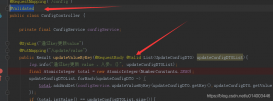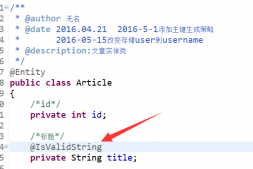收到请求->生成验证码所用的随机数->使用随机数写出图片->将随机数记录到Session中->输出验证码
Java 验证验证码的流程是:
收到请求->获取用户传过来的验证码数字->验证是否正确->输出验证结果
下面通过一个例子来展示验证码的生成流程,该例子使用基本Java Spring框架的Rest接口,可以使用任何平台来获取验证码:
服务器处理验证码的例子:
1.接收验证码请求:
|
1
2
3
4
5
6
7
8
9
10
11
12
13
14
15
16
17
18
19
20
21
22
23
24
|
/** * 接收验证码请求 */@RequestMapping(value="captchacode")public void CaptchaCode(){ try { CaptchaCodeModel captchaCodeModel=new CaptchaCode().getCode(); //将验证码放到Session中 HttpServletRequest httpServletRequest=super.getRequest(); httpServletRequest.getSession().setAttribute("captchacodekey", captchaCodeModel.getCaptchaCode()); //将图片写到客户端 HttpServletResponse httpServletResponse=super.getResponse(); //禁止缓存 httpServletResponse.setHeader("Pragma", "no-cache"); httpServletResponse.setHeader("Cache-Control", "no-cache"); httpServletResponse.setDateHeader("Expires", 0); ServletOutputStream servletOutputStream=httpServletResponse.getOutputStream(); //输出图片 ImageIO.write(captchaCodeModel.getCaptchaImage(), "jpeg", servletOutputStream); servletOutputStream.close(); } catch (Exception e) { logger.info("验证码生成失败:"+e.getMessage()); }} |
2.生成验证码并生成图片:
|
1
2
3
4
5
6
7
8
9
10
|
public class CaptchaCode {private int width = 90;// 定义图片的widthprivate int height = 20;// 定义图片的heightprivate int codeCount = 4;// 定义图片上显示验证码的个数private int xx = 15;private int fontHeight = 18;private int codeY = 16;char[] codeSequence = { 'A', 'B', 'C', 'D', 'E', 'F', 'G', 'H', 'I', 'J','K', 'L', 'M', 'N', 'O', 'P', 'Q', 'R', 'S', 'T', 'U', 'V', 'W','X', 'Y', 'Z', '0', '1', '2', '3', '4', '5', '6', '7', '8', '9' }; |
|
1
2
3
4
5
6
7
8
9
10
11
12
13
14
15
16
17
18
19
20
21
22
23
24
25
26
27
28
29
30
31
32
33
34
35
36
37
38
39
40
41
42
43
44
45
46
47
48
49
50
51
52
53
54
55
56
57
58
59
60
61
62
63
64
65
66
|
public CaptchaCodeModel getCode() throws IOException { // 定义图像buffer BufferedImage buffImg = new BufferedImage(width, height, BufferedImage.TYPE_INT_RGB); Graphics gd = buffImg.getGraphics(); // 创建一个随机数生成器类 Random random = new Random(); // 将图像填充为白色 gd.setColor(Color.WHITE); gd.fillRect(0, 0, width, height); // 创建字体,字体的大小应该根据图片的高度来定。 Font font = new Font("Fixedsys", Font.BOLD, fontHeight); // 设置字体。 gd.setFont(font); // 画边框。 gd.setColor(Color.BLACK); gd.drawRect(0, 0, width - 1, height - 1); // 随机产生40条干扰线,使图象中的认证码不易被其它程序探测到。 gd.setColor(Color.BLACK); for (int i = 0; i < 40; i++) { int x = random.nextInt(width); int y = random.nextInt(height); int xl = random.nextInt(12); int yl = random.nextInt(12); gd.drawLine(x, y, x + xl, y + yl); } // randomCode用于保存随机产生的验证码,以便用户登录后进行验证。 StringBuffer randomCode = new StringBuffer(); int red = 0, green = 0, blue = 0; // 随机产生codeCount数字的验证码。 for (int i = 0; i < codeCount; i++) { // 得到随机产生的验证码数字。 String code = String.valueOf(codeSequence[random.nextInt(36)]); // 产生随机的颜色分量来构造颜色值,这样输出的每位数字的颜色值都将不同。 red = random.nextInt(255); green = random.nextInt(255); blue = random.nextInt(255); // 用随机产生的颜色将验证码绘制到图像中。 gd.setColor(new Color(red, green, blue)); gd.drawString(code, (i + 1) * xx, codeY); // 将产生的四个随机数组合在一起。 randomCode.append(code); } CaptchaCodeModel captchaCodeModel=new CaptchaCodeModel(); captchaCodeModel.setCaptchaCode(randomCode.toString()); captchaCodeModel.setCaptchaImage(buffImg); return captchaCodeModel;}public class CaptchaCodeModel{ //验证码的String形式 private String captchaCode; //验证码的图片形式 private BufferedImage captchaImage; public String getCaptchaCode() { return captchaCode; } public void setCaptchaCode(String captchaCode) { this.captchaCode = captchaCode; } public BufferedImage getCaptchaImage() { return captchaImage; } public void setCaptchaImage(BufferedImage captchaImage) { this.captchaImage = captchaImage; }} |
3.接收用户传过来的验证码并验证:
|
1
2
3
4
5
6
7
8
9
10
11
12
13
14
15
16
17
18
19
20
21
|
/*** 验证验证码*/@RequestMapping(value = "valicatpcha")public void register_R() {PageData pageData = super.getPageData(); // 获取验证码 String captchaCode = pageData.getString("captchacode"); HttpServletRequest httpServletRequest = super.getRequest(); Object codeObject = httpServletRequest.getSession().getAttribute(“captchacodekey”); // 验证码错误 if (codeObject == null || Tools.isEmptyString(captchaCode) || !String.valueOf(codeObject).toUpperCase() .equals(captchaCode.toUpperCase())) { setResult( MessageManager.getInstance().getMessage("invalidcaptcha"), ResultType.Error); return; }} |
页面请求验证码并验证的例子:
-请求验证码:<img src='captchacode' style='height:32px;width:148px;'
-验证验证码:
|
1
2
3
4
5
6
7
8
9
10
11
12
13
14
15
16
17
|
function validcaptchacode(captchaCode) {$.ajax({type : "POST",url : "valicatpcha",data : {captchacode : captchaCode,tm : new Date().getTime()},dataType : "json",cache : false,success : function(data) {alert(data);},error : function(data) {alert(data); }});} |
以上就是本文的全部内容,希望本文的内容对大家的学习或者工作能带来一定的帮助,同时也希望多多支持服务器之家!
原文链接:http://www.cnblogs.com/yujie365/p/6391371.html

















